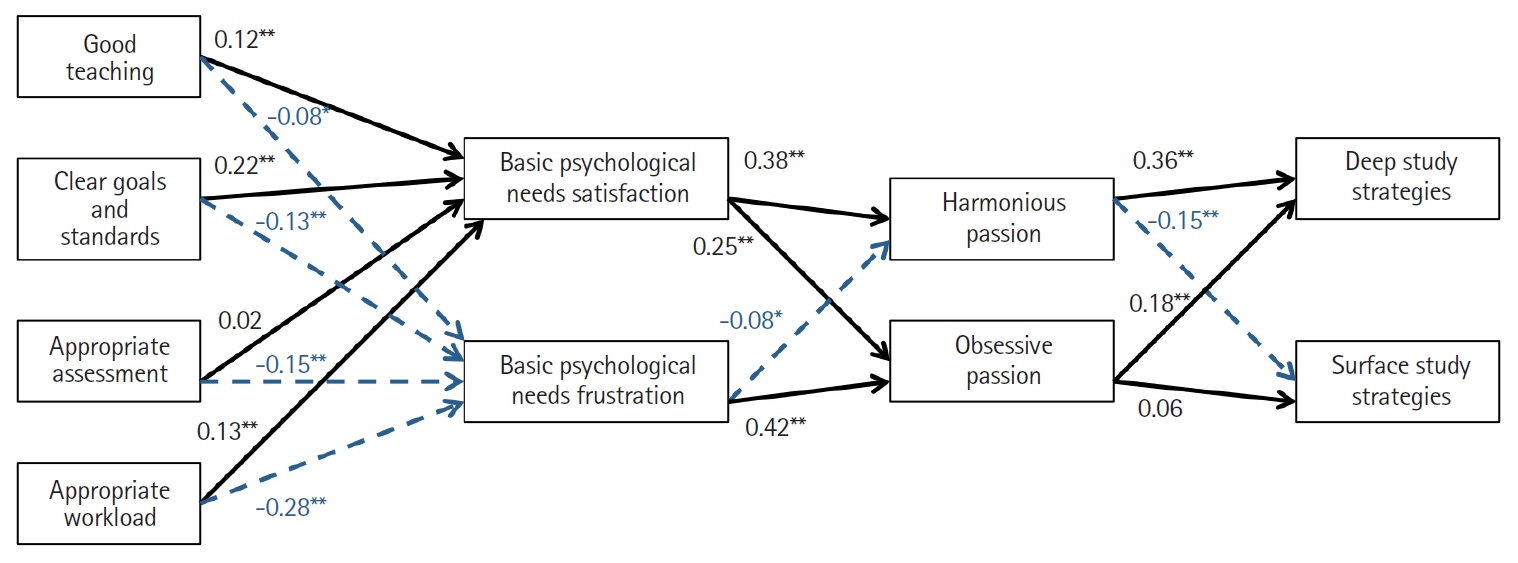J Educ Eval Health Prof.
2019;16:37. 10.3352/jeehp.2019.16.37.
How dental students’ course experiences and satisfaction of their basic psychological needs influence passion for studying in Chile
- Affiliations
-
- 1Faculty Development Office, Faculty of Dentistry, Universidad de los Andes, Las Condes, Chile
- 2Department of Dentistry, Faculty of Medicine and Dentistry, Universidad de Antofagasta, Antofagasta, Chile
- 3Institute of Odontostomatology, Dental School, Faculty of Medicine, Universidad Austral de Chile, Valdivia, Chile
- KMID: 2502162
- DOI: http://doi.org/10.3352/jeehp.2019.16.37
Abstract
- Purpose
This study aimed to determine how the general course experiences of dental students in Chile and the satisfaction or frustration of their basic psychological needs influenced their passion for studying, and how passion influenced students’ study strategies.
Methods
A correlational cross-sectional study was conducted at 3 Chilean dental schools between April and June 2018, in which 935 undergraduate students participated. Students responded to Spanish-language versions of 4 psychological scale tools: the Course Experience Questionnaire, the Basic Psychological Needs Satisfac¬tion and Frustration Scale, the Passion Scale, and the Revised Study Process Questionnaire. Data were analysed with bivariate correlations and structural equation modelling, controlling for age, gender, year of study, and type of university.
Results
Students’ general course experiences (i.e., good teaching, clear goals and standards, appropriate assessment, and appropriate workload) positively predicted basic need satisfaction and negatively predicted need frustration. Need satisfaction positively predicted passion in students, with stronger scores for harmonious passion. Basic need frustration positively predicted obsessive passion and negatively predicted harmonious passion. Harmonious passion positively predicted deep study strategies and negatively predicted surface study strategies, while obsessive passion positively predicted both deep and surface study strategies.
Conclusion
Dental students’ optimal course experiences positively influenced the satisfaction of their basic psychological needs, which favoured harmonious over obsessive passion. In turn, harmonious over obsessive passion positively influenced deep study strategies. Therefore, efforts should be made to provide course experiences that support students’ basic needs and harmonious passion for studying, both in classroom and chair-side teaching.
Keyword
Figure
Reference
-
References
1. Orsini C, Binnie VI, Wilson SL. Determinants and outcomes of motivation in health professions education: a systematic review based on self-determination theory. J Educ Eval Health Prof. 2016; 13:19. https://doi.org/10.3352/jeehp.2016.13.19.
Article2. Serrano CM, Botelho MG, Wesselink PR, Vervoorn JM. Challenges in the transition to clinical training in dentistry: an ADEE special interest group initial report. Eur J Dent Educ. 2018; 22:e451–e457. https://doi.org/10.1111/eje.12324.
Article3. Stoeber J, Childs JH, Hayward JA, Feast AR. Passion and motivation for studying: predicting academic engagement and burnout in university students. Educ Psychol. 2011; 31:513–528. https://doi.org/10.1080/01443410.2011.570251.
Article4. Orsini CA, Binnie VI, Jerez OM. Motivation as a predictor of dental students’ affective and behavioral outcomes: does the quality of motivation matter? J Dent Educ. 2019; 83:521–529. https://doi.org/10.21815/JDE.019.065.
Article5. Vallerand RJ. On passion for life activities: the dualistic model of passion. Adv Exp Soc Psychol. 2010; 42:97–193. https://doi.org/10.1016/S0065-2601(10)42003-1.
Article6. Curran T, Hill AP, Appleton PR, Vallerand RJ, Standage M. The psychology of passion: a meta-analytical review of a decade of research on intrapersonal outcomes. Motiv Emot. 2015; 39:631–655. https://doi.org/10.1007/s11031-015-9503-0.
Article7. Vallerand RJ. The dualistic model of passion: theory, research, and implications for the field of education. In : Liu WC, Wang JC, Ryan RM, editors. Building autonomous learners. Singapore: Springer;2016; 31–58.8. Ryan RM, Deci EL. Self-determination theory: basic psychological needs in motivation, development, and wellness. New York (NY): Guilford Publications;2017.9. Biggs J, Tang C. Teaching for quality learning at university. London: McGraw-Hill International;2011.10. Gonzalez C, Montenegro H, Lopez L. Analysis of the reliability and validity of the course experience questionnaire (CEQ). Educ Educ. 2012; 15:63–78.11. Chen B, Vansteenkiste M, Beyers W, Boone L, Deci EL, van der Kaap-Deeder J, Duriez B, Lens W, Matos L, Mouratidis A, Ryan RM, Sheldon KM, Soenens B, van Petegem S, Verstuyf J. Basic psychological need satisfaction, need frustration, and need strength across four cultures. Motiv Emot. 2015; 39:216–236. https://doi.org/10.1007/s11031-014-9450-1.
Article12. Chamarro A, Penelo E, Fornieles A, Oberst U, Vallerand RJ, Fernandez-Castro J. Psychometric properties of the Spanish version of the Passion Scale. Psicothema. 2015; 27:402–409. https://doi.org/10.7334/psicothema2015.80.
Article13. Justicia F, Pichardo MC, Cano F, Berben AB, De la Fuente J. The revised two-factor study process questionnaire (R-SPQ-2F): exploratory and confirmatory factor analyses at item level. Eur J Psychol Educ. 2008; 23:355–372. https://doi.org/10.1007/BF03173004.
Article14. Kline RB. Principles and practice of structural equation modeling. New York (NY): Guilford publications;2010.15. Orsini C, Binnie V, Wilson S, Villegas MJ. Learning climate and feedback as predictors of dental students’ self-determined motivation: the mediating role of basic psychological needs satisfaction. Eur J Dent Educ. 2018; 22:e228–e236. https://doi.org/10.1111/eje.12277.
Article16. Colbert-Getz JM, Kim S, Goode VH, Shochet RB, Wright SM. Assessing medical students’ and residents’ perceptions of the learning environment: exploring validity evidence for the interpretation of scores from existing tools. Acad Med. 2014; 89:1687–1693. https://doi.org/10.1097/ACM.0000000000000433.
Article17. Van Houten-Schat MA, Berkhout JJ, van Dijk N, Endedijk MD, Jaarsma AD, Diemers AD. Self-regulated learning in the clinical context: a systematic review. Med Educ. 2018; 52:1008–1015. https://doi.org/10.1111/medu.13615.
Article18. Orsini C, Evans P, Binnie V, Ledezma P, Fuentes F. Encouraging intrinsic motivation in the clinical setting: teachers’ perspectives from the self-determination theory. Eur J Dent Educ. 2016; 20:102–111. https://doi.org/10.1111/eje.12147.
Article
- Full Text Links
- Actions
-
Cited
- CITED
-
- Close
- Share
- Similar articles
-
- Motivational profiles and their relationships with basic psychological needs, academic performance, study strategies, self-esteem, and vitality in dental students in Chile
- Influence of Dental Hygienist’s Job Satisfaction, Psychological Ownership, and Job Engagement on Job Performance
- How to encourage intrinsic motivation in the clinical teaching environment?: a systematic review from the self-determination theory
- Nursing students’ relationships among resilience, life satisfaction, psychological well-being, and attitude to death
- The effect of quality of life and interpersonal relationship satisfaction on academic achievement in dental hygiene students



